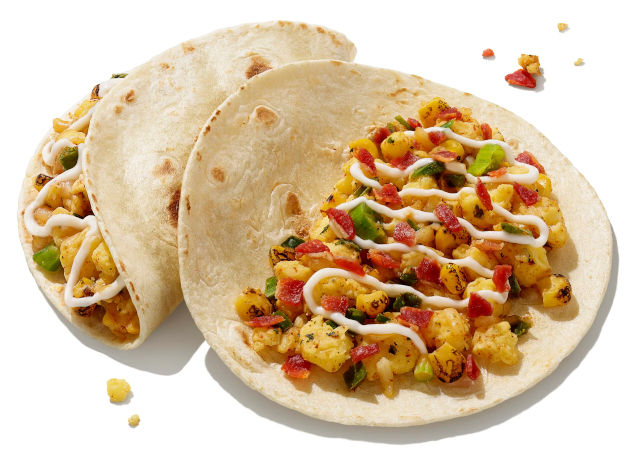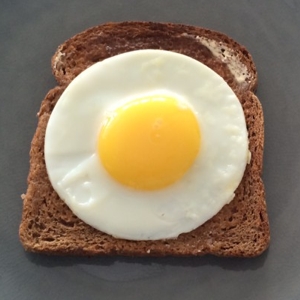March must be ‘breakfast month’ on the social media front. A cavalcade of breakfast-related posts have come to my attention over the past two weeks. With opinions from ‘pooh-pooh’ to ultra-positive. Now, there’s the ’30-30-30′ system…
 Breakfast Tacos or Burritos are a great way to start your day – with essential
Breakfast Tacos or Burritos are a great way to start your day – with essential
protein and veggies. And don’t forget whole grain bread or cereal!
We’ve reviewed a bunch of breakfast-related posts lately, both from social media and learned quarters, all pushing strong opinions on the concept of breakfast.
The most pessimistic contended that the old saying that, “breakfast is the most important meal of the day,” is hokum. Others defended the concept of a healthy breakfast as unassailable gospel.
Still others offered new and intriguing theories of breakfast, covering all angles: What to eat, when to eat and where to eat.
Now, we’ve been made wise to the so-called ’30-30-30′ system…
For the record…
Real, honest-to-goodness authorities agree that we should eat a healthy breakfast. We should eat it within an hour of rising for the day. And at least one source says we should follow up with at least an hour of exercise – even if it’s just a brisk walk – within the next hour.
What ’30-30-30′ is…
“The 30-30-30 rule first popped up in Timothy Ferriss’s bestselling book The 4-Hour Body,” Korin Miller writes, on PopSugar. “But this method really took off after biologist Gary Brecka started promoting it on TikTok.”
Brecka insists his plan can help you manage your blood sugar, lose weight, and enjoy more energy than other eating plans.
Yes, the promoter of the ’30-30-30′, you should eat a healthy breakfast. All well and good. The schedule is the key. “It involves eating 30 grams of protein within the first 30 minutes after you wake up, which is then followed by 30 minutes of exercise.”
What the experts say…
“I love that this rule is encouraging people to get daily exercise and have a significant amount of protein in the morning,” says Christy Brissette, RD, founder of 80 Twenty Nutrition in Laguna Beach, CA.
“Getting protein in the morning is good,” agrees Scott Keatley, RD, co-owner of Keatley Medical Nutrition Therapy. “Your body before exercise is generally able to absorb about 20 grams in a sitting. After exercise, it can increase significantly.”
However… Keatly has some real questions about the specifics of thye ’30-30-30′ plan. For a start, if calories are at the forefront, why not carbs and protein? “Why not have 15 grams of both 15 minutes after waking up and exercising for 15 minutes?”
On the plus side…
Keatly observes, it’s good to start your day with a significant dose of protein. That helps you feel full, so you don’t overdo the meal, and may help carry you through the demon mid-morning letdown. And starting with a ‘pool’ of protein can help your body cope all through your active day.
The exercise component makes sense, he says, because activity helps your body process and absorb the protein.
On the down side…
Brecka says you can eat anything else you want with your breakfast – as long as you get that 30 g of protein. That doesn’t make a lot of sense to me. Or to the experts. Does he mean, you can have all the added sugar salt and fat you want? Without suffering the obvious consequences?
About all that protein… The official recommendations say you should consume 0.8 g of protein daily for each kg / 2.2 lb. of body weight. That’s 55.5 g for atypical 150 lb. / 68 kg adult. And Brecka wants you to have 30 all in one whack.
“When you eat, your body sends blood to your stomach to help with digestion,” Brissette explains. “If you’re exercising at that time, the blood will move to your working muscles instead, making digestion happen more slowly. This could lead to bloating or stomach pain.”
Will it help you lose weight?
One of the key objectives of the ’30-30-30′ system is weight loss. And quick loss, at that. No quick weight loss system is endorsed by legit authorities on diet and nutrition. And the truth is, most folks who crash off a significant amount of weight often gain it back just as fast when they go off the ‘plan’. More than one of the experts Miller quotes warns that too much protein can be problematic, health-wise. Your body has to work hard to digest it.
“You need to do what’s best for you and your unique body,” Brissette says. “Many of my clients come to me with damaged metabolisms, and are completely confused about food after years of following what [popular] diet culture has dictated. We need to learn to work with our bodies, rather than trying to ‘trick’ them.”
My take
I’m with Brissette. We’re all unique. And our needs are equally specific to each of us. My doctor told me years ago to eat a protein- and whole grains-rich breakfast with fresh fruit. Then go for a brisk walk for at least an hour. Every day. I lost weight at a sustainable rate and felt great – better than I had in the 20 years before that epiphany. Then my life circumstances changed. And I ballooned again – back to where I started before the doctor and I had our little talk.
So I’m heading off on the balanced breakfast-and-a-walk routine again, as soon as the great outdoors warms up, and dries up enough to permit reasonably unhindered perambulation.
As for the ’30-30-30′ system… I’m fine with what I have, thanks.
~ Maggie J.

